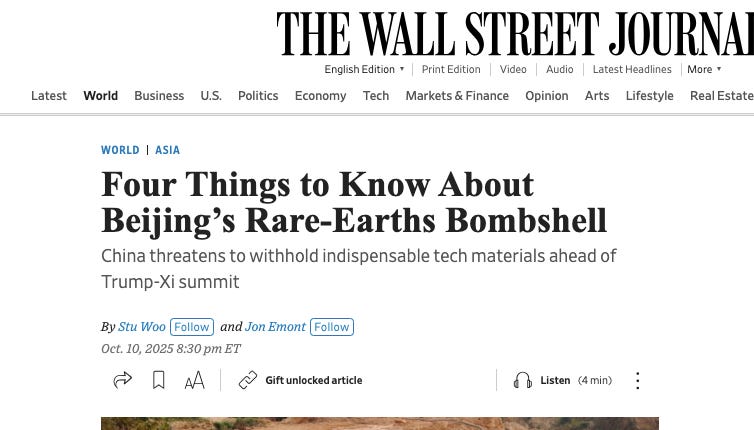Monopoly Round-Up: Will the Trade War Pop the AI Bubble?Tech monopolies have created an AI bubble that could take down the economy. China just threatened to pop it. What happens now? Plus, the Pope dons his anti-monopoly hat, and more.Lots of monopoly news, as usual, including the Pope putting on his anti-monopoly hat, some actually good antitrust decisions at the Supreme Court, a new law in California that lets you opt out of most tracking through a one click toggle in your browser, and new levels of corruption in sports gambling. But first, I want to focus on the most important monopoly story of the week, which is what China just did with its export regime. The PRC unveiled sweeping global controls on its monopoly of rare earth materials that go into every major tech system built on this planet, meaning that it will decide who gets to participate in the modern economy, including whether Americans can continue to build AI data centers. In fact, China explicitly said that it would focus on rare earths that go into high-end semiconductors. So while China imposed the controls all nations, the U.S. response is especially important. Trump’s rejoinder is that China is “holding the world captive” from a “monopoly position,” and he issued a variety of threats, including tariffs. To understand the importance China’s decision, we have to start with a storyline that everyone in the financial markets talks about daily, which is the bubble in generative artificial intelligence technology, and how it’s holding up the U.S. economy. Now, AI is a genuine technological innovation, so this essay isn’t attempting to belittle what machine learning can do. But we have to distinguish between engineering advances, and financial investment patterns. And right now, decision-making on investment is coming from a particularly concentrated set of firms controlling profits in the economy, and the small number of people making decisions at those firms have placed their chips, and thus America’s chips, on a large AI data center build-out. Here’s what I mean. A few years ago, Mark Zuckerberg changed Facebook’s name to Meta, with the idea that virtual reality and augmented reality were going to be the next computing platform, versus social networking, which made all of his company’s profit (and still does). Since then, Meta has spent $45 billion on “the Metaverse,” an odd attempt to popularize tacky virtual reality worlds. While there are some interesting projects coming out of all of this spending, so far it has mostly been a massive money-losing venture. And yet, Zuckerberg’s net worth has doubled, to more than $200 billion, and investors had no problem with this huge expenditure of capital.
Now, $45 billion is a lot of money; it’s more than the total amount spent in the CHIPS Act to reshore semiconductors. And one guy got to invest it, without any accountability, on a random bet on virtual reality. Why was Zuckerberg able to make these largely unprofitable investments? Where is the money coming from? The answer is that he is levying a tax on millions of businesses around the world that need to reach customers. On the Odd Lots podcast a few months ago, the hosts interviewed a fashion company CEO complaining that the cost of acquiring a customer had gone from $13 to $250 over ten years, due to higher prices on Instagram and the inability of any other ad platform to offer comparable results. “One of the things that must be going on in the economy,” the host said, “is everybody’s margin becoming Facebook’s profits.” It’s the monopoly, stupid, only over a significant part of the economy. The reason that stream of profit is going to one firm, instead of being disbursed to the millions of businesses over-spending on advertising, is weak antitrust and regulatory choices. It’s not Zuckerberg’s bad judgment in avatars that’s moving this capital, but policy. Think about it; Mark Zuckerberg was CEO of Facebook, and as a side job he had to find profitable ways to use $45 billion. That’s incredibly hard. A more normal and effective way to invest is to divide that money into smaller chunks, and have a bunch of businesses or banks finding profitable ways to invest it. That’s how things used to work. But the rise of big tech as a result of weak antitrust changed the economy. If it weren’t Zuckerberg doing it, it would just be someone similar. The consolidation of power and wealth has led to a historic anomaly. As JP Morgan’s Michael Cembalist pointed out, the biggest and most powerful companies in the economy are also growing faster than normal firms. Cembalist noted that there’s big tech stocks, and there’s everyone else. Now, the Metaverse was at worst dumb and a waste of a lot of money, because no one followed Zuckerberg. But when you take Zuckerberg’s ability to use monopoly profits, and throw in a few other big tech firms making the same bet, with private equity and Wall Street following on, then the situation changes. That’s where we are with generative artificial intelligence. This time, it’s not just a weird choice to invest in virtual reality, it’s de facto national industrial policy. I did some rough and dirty calculations, and found that Meta, Google, Microsoft, Amazon, and Nvidia are 15% of all non-financial corporate profits. And that’s understating their control of the country’s financial assets; these companies are pouring hundreds of billions of dollars of their cash flow directly into data centers. That reduces some of their accounting profits, which makes it look like they are less powerful than they are. And increasingly they are using the funds of financial titans, like Pimco, KKR, Blackstone, and others, in addition to their own cash flow. AI data centers, according to Paul Kedrosky, are now larger than the telecom boom of the dot com era, and beginning to look like railroads in the 1880s. If it weren’t for the AI boom, the U.S. would probably in a recession. As Herb Greenberg, an important Wall Street reporter noted, there are some eery parallels to those earlier crises. Nvidia is doing vendor financing, which means it is investing in companies that then buy its chips, a classic case of “round-tripping” which makes revenue appear higher without increasing real revenue. One of its investments, CoreWeave, is getting both investment and lending from a hedge fund, Magnetar, which was deeply involved in exotic trades around the subprime crisis. And odd forms of shadow banking known as “private credit” and less regulated “business development corporations” are increasingly involved in the data center build-out. And that’s not to mention the power, water, and resources these centers require, and the skepticism people have when told a technology will raise their electricity bills and take their jobs. No one knows when or how such a bubble pops, or how much damage it will do. There’s a general view that there is perhaps too much investment, but it’s not that big a deal since AI will be useful regardless. Zuckerberg, for instance, thinks a bubble is “quite possible,” saying “If we end up misspending a couple of hundred billion dollars, I think that that is going to be very unfortunate, obviously. But what I’d say is I actually think the risk is higher on the other side.” The advances in tech are worth it, he believes. Yet even if the technology itself becomes critical to modern life, bubbles as industrial policy are very dangerous. In the late 1860s a wild boom in railroads - certainly a useful technology that literally allowed people to travel across the country - led to a crash and depression starting in 1873. That political crisis had many important consequences, few of them good. For instance, it shattered post-Civil War union politics, which had been centered around making freed slaves full citizens. Here’s WEB Dubois in the classic history of race relations, Black Reconstruction, making that point:
So extending railroads using bubble financing helped establish Jim Crow. That’s very bad! As John Maynard Keynes put it, “When the capital development of a country becomes a by-product of the activities of a casino, the job is likely to be ill-done.” Still, bubbles can last for a long time. It’s also possible that AI isn’t a bubble, that the technology will be so profitable as to justify the $400 billion in annual projected data center spending. But it’s clear, whether bubble or not, that if that data center spending stops, America is going to lose a major source of growth. And that’s where China comes in. You see, the Chinese government, for geopolitical reasons, has decided to withhold critical technologies from the rest of the world, including key inputs for everything from oil drilling to data center build-outs. It’s somewhat a response to Trump, but it’s more than that; Germans are freaking out because they are getting hit too.
Trump has reacted by imposing tariffs, but there’s not that much leverage in using those at this point. There are other levers Trump could use, so this story isn’t over, by a long shot. No one knows whether China will follow-through; the stock market fell sharply on Friday, but it wasn’t the kind of actual crash you’d see if people really thought China would end the data center build-out. And it could all just be a hard-nosed negotiating posture, with a plan to relax it soon. (Though it is notable that the TikTok deal hasn’t gone through yet, so China could block that as well.) All that said, Chinese leverage over U.S. politics is remarkable to see. For a long time, the expression in China was “Hide your strength, bide your time.” No longer. And it’s not a result of Trump, though Trump’s tactics likely accelerated China’s new posture. I wrote about this strategy years ago.
Trump himself just articulated this point. “There is no way that China should be allowed to hold the World ‘captive,’” he wrote on TruthSocial, “but that seems to have been their plan for quite some time, starting with the “Magnets” and, other Elements that they have quietly amassed into somewhat of a Monopoly position, a rather sinister and hostile move, to say the least.” So there we go. I don’t know that China will pop the AI bubble. But something probably will eventually. And now the round-up after the paywall. Lots of great stories, including the Pope attacking media monopolies and ‘clickbait,’ the Supreme Court slapping down Ticketmaster, Sharpies being made in America again, a mini-crypto crash, Donald Trump Jr-related corruption in sports betting, and the ‘doctor’s lobby, the American Medical Association, got attacked by a Senator for screwing doctors with its monopoly over billing codes... Continue reading this post for free in the Substack app |



